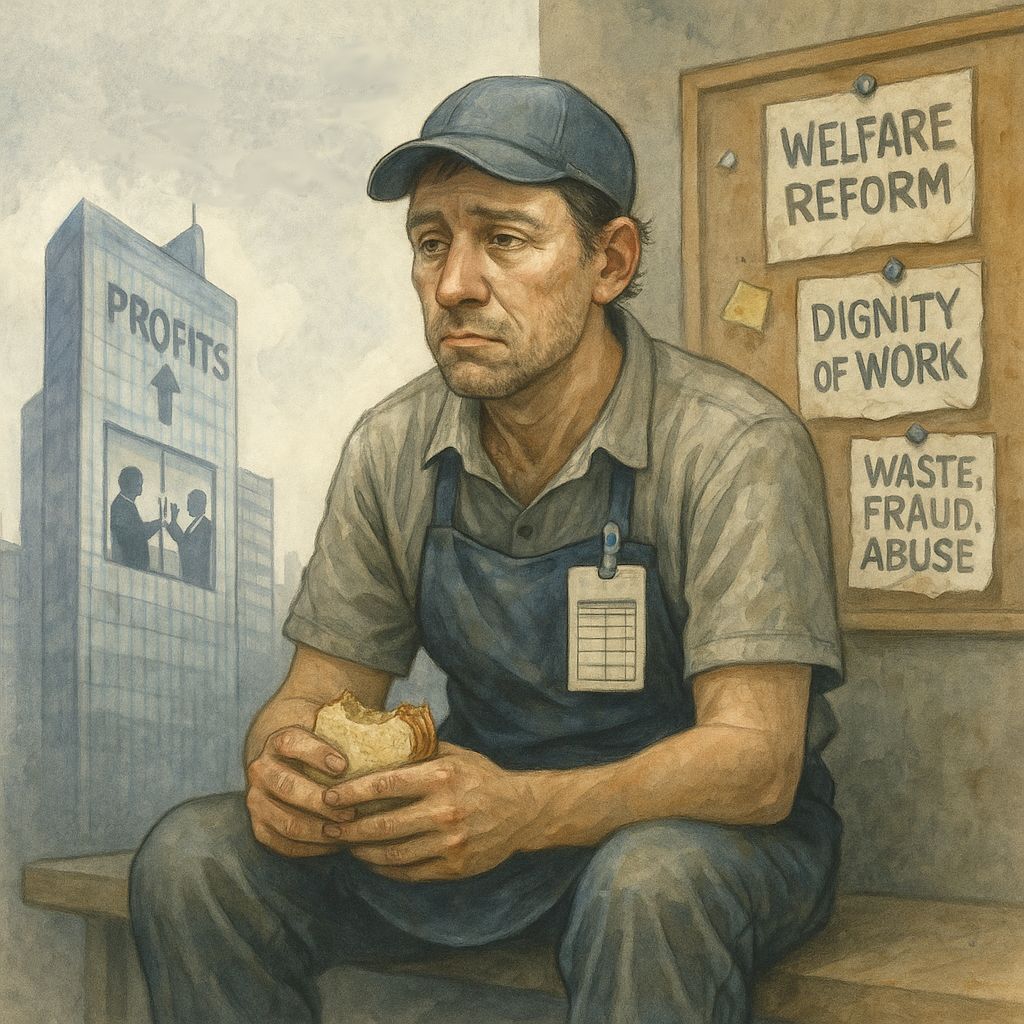- The Frontline Progressive
- Posts
- The Dignity Delusion
The Dignity Delusion
How Republicans use “work” to shame the poor and distract from corporate greed

The phrase "dignity of work" has become a central talking point for Republicans pushing welfare reform. In a recent press release from the U.S. House Ways and Means Committee, Chairman Jason Smith (MO-08) and others introduced the so-called JOBS for Success Act, a bill to reform the Temporary Assistance for Needy Families (TANF) program. It sounds noble at first glance. After all, who can't get behind a program to help people find jobs, get them off government assistance, and restore their dignity? But dig deeper, and the picture becomes far more disturbing.
The framing of this bill—and the broader narrative surrounding it—suggests that dignity is not inherent in human life; rather, it is something you must earn through labor. It follows that if you're not working, you have no dignity and do not deserve respect. This message doesn’t just stigmatize unemployed people; it criminalizes poverty. It tells the public that people in need are suspect until proven industrious. It legitimizes treating the poor as parasites on our society.
When you peel back the dehumanizing rhetoric and see what's really taking place behind the scenes, you see that millions of Americans are already working but still rely on government assistance to survive. Companies like Amazon and Walmart, among the largest employers in the country, pay wages so low that their workers qualify for public benefits. Walmart even provides information to its employees showing them how to apply for government assistance. While we stigmatize the poor, we allow our biggest employers to rely on government assistance to support their labor force. Think about that: our tax dollars subsidize Walmart and Amazon so they can pay their employees starvation wages. At the same time, politicians like Jason Smith push for policies that drain even more from the system sustaining these employees. So the question is: are these workers somehow lacking? Or is the system terribly broken?
The rhetoric becomes even more dangerous when tied to the repeated, unsubstantiated claims of "waste, fraud, and abuse" within our government. Representative Smith and his colleagues warn of a bloated welfare system rife with corruption, yet fail to cite a single example. Not. One. Example. Even Elon Musk’s high-profile efforts to find this so-called "waste, fraud, and abuse" within government programs turned up virtually nothing, less than 0.07%, and even that number was suspect. Republicans have learned that they never need actual data to push their myths; they merely need to utter the words, and the myth becomes reality. Their "alternative facts" convince voters that lazy freeloaders are stealing their hard-earned money. As Republicans have learned over the past decade, the spreading of lies is far easier than confronting the real causes of poverty: stagnant wages, corporate greed, unaffordable housing, an abysmal wealth gap, and the lack of universal healthcare.
Don't be surprised if, at some point, Republicans print "Arbeit macht frei" on their campaign merch. While we are not making direct comparisons to the horror behind those words, the idea that people only have value and deserve respect and dignity if they work will, in the long run, prove equally dangerous to society overall. Our nation was built on the principle that we are born with certain inalienable rights, among them are life, liberty, and the pursuit of happiness. There's nothing in our founding documents that tied those dignities to labor.
Let’s be clear: everyone deserves food, shelter, and opportunity. Not because they work, but because they are human. If we truly want to lift people out of poverty, we should start by demanding that corporations pay living wages and that public policy reflect the real economic challenges faced by ordinary Americans.
To be sure, work can be meaningful. But weaponizing it to shame the vulnerable is not policy; it’s cruelty dressed in moral clothing.
Reply